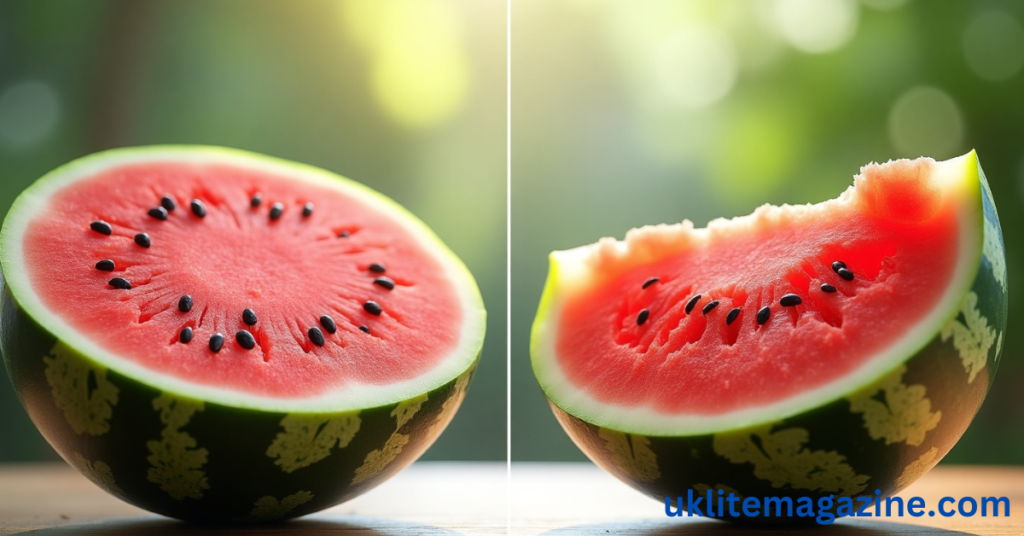Watermelon is one of the most refreshing and hydrating fruits enjoyed during the summer. Over the years, seedless watermelons have become more popular due to their convenience. But are they as healthy as the traditional seeded variety? In this article, we explore the differences between seeded and seedless watermelon, their health benefits, and which one may be better for you.
What Is a Seeded Watermelon?
A seeded watermelon is the traditional form of the fruit, containing large black or dark brown seeds. These seeds are produced through natural pollination and contain all the genetic material to grow new watermelon plants.
Health Benefits of Seeded Watermelon
-
Rich in vitamins A, B6, and C.
-
Contains antioxidants like lycopene and beta-carotene.
-
The seeds are edible and contain protein, magnesium, and healthy fats.
-
Naturally grown without genetic modification.
What Is a Seedless Watermelon?
A seedless watermelon is a hybrid fruit that is grown through a specific cross-breeding technique. These watermelons typically have small, soft, white seeds that are barely noticeable and not fertile.
Why Seedless Watermelons Exist
Seedless watermelons were developed for convenience. They are easier to eat and cut, especially for children or in salads. However, the growing process is more complex and involves sterile plants that cannot reproduce on their own.
Seeded vs Seedless Watermelon: A Quick Comparison
Here’s a side-by-side comparison to help you understand the key differences:
| Feature | Seeded Watermelon | Seedless Watermelon |
|---|---|---|
| Seeds | Black/brown hard seeds | Soft, white, underdeveloped seeds |
| Origin | Natural pollination | Hybrid through cross-breeding |
| Nutrition | Seeds contain nutrients like magnesium | Slightly lower nutrient diversity |
| Taste | Richer, more traditional flavor | Sweeter but often less flavorful |
| Availability | Less common in stores | Widely available and preferred by many |
| GMO status | Not genetically modified | Not GMO, but hybridized |
| Seed Nutrition | Seeds are edible and nutritious | Seeds are immature and not beneficial |
Is One Better Than the Other?
It depends on what you prioritize:
-
If convenience and ease of eating matter most, seedless watermelon is a great choice.
-
If you’re looking for maximum health benefits, go for seeded watermelon. The seeds themselves are packed with nutrients that can contribute to your overall wellness.
Can You Eat Watermelon Seeds?
Yes, watermelon seeds are edible — especially when they come from a seeded watermelon. They are rich in:
-
Protein
-
Magnesium
-
Zinc
-
Healthy fats
You can roast them or eat them raw, though roasting improves taste and texture.
Why Are Seeded Watermelons Becoming Rare?
Seeded watermelons are less available due to high consumer demand for seedless varieties. Farmers and retailers find seedless types easier to market, especially to kids and in convenience stores. However, many traditional farms still grow seeded ones, especially for health-conscious consumers.
Conclusion
Both seeded and seedless watermelons are healthy, hydrating fruits with plenty of benefits. But if you’re looking for a more natural, nutrient-dense option, the seeded watermelon may be the better choice. The seeds themselves are a bonus, offering extra nutrition that seedless varieties lack. While seedless watermelons win in convenience, seeded watermelons win in wholesomeness.
Frequently Asked Questions (FAQs)
Is it better to eat seeded or seedless watermelon?
Both are nutritious, but seeded watermelon has more natural benefits, including protein and minerals in the seeds.
Is it good to eat seeds of watermelon?
Yes, watermelon seeds are rich in magnesium, protein, and good fats. Roasting them is a popular way to enjoy their nutritional benefits.
What is watermelon seeding?
Watermelon seeding refers to the process of planting and growing watermelons that contain seeds. It also refers to the act of removing seeds before eating.
Why do watermelons not have seeds anymore?
Due to consumer preference, seedless varieties are more commonly produced. They are hybrids made through cross-pollination, not genetic modification.
Seeded watermelon benefits
-
Richer in flavor
-
Natural source of magnesium and zinc
-
Seeds boost protein intake
-
Less processed and closer to wild fruit
Are seedless watermelons bad for you?
No, they are not harmful. They still provide hydration, vitamins, and antioxidants. They’re just less nutrient-rich compared to the seeded ones.

